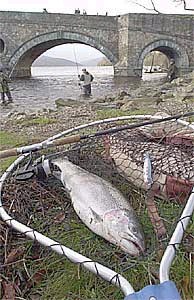|
Experts estimate that, although the fishery is technically classed as English, as it is conducted largely from Northumbrian ports, between 70 and 80 per cent of the fish caught would otherwise return to east coast Scottish rivers where they help to rejuvenate dwindling wild stocks, improve the health of river systems and provide a vital boost to rural economies dependent on salmon rivers.
The North Atlantic Salmon Fund (NASF) has been negotiating with the netsmen working the fishery for the past three years. In January this year, after a contribution of £1.25 million from the Department for the Environment, Food and Rural Affairs (), 52 of the 69 netsmen agreed to a deal which would cost £3.32 million.
However, after contributions from the salmon fishery boards of rivers throughout Scotland, there still remains a shortfall of £700,000 necessary for the deal to be completed.
Lord Forsyth of Drumlean, formerly the Scottish Secretary, initiated a two-hour debate in the House of Lords last month to call attention to the plight of Atlantic salmon.
He said: "We are now in this extraordinary situation where the NASF has managed to persuade the people of Greenland and the Faroes to give up netting on a semi-permanent basis. Now they are asking why they have committed themselves to this when we still remain doing it.
"For reasons I cannot understand, other than the often-quoted ‘this is not within our jurisdiction’, the Scottish Executive has refused to contribute.
"There have been various approaches and they always have said ‘no’, on the basis that it is an English fishery. That is technically correct, but if you look at it from the point of view of what is in Scotland’s interests and what the Scottish Executive is for, they could do it through Scottish Enterprise as a rural support measure."
He added: "I really do believe that we could see this creature disappear without action. This is something which people have struggled for years to achieve, and if we can get it right then we can move on to other issues."
The payments for the buyout will be made in two parts, one at the end of this month and one at the same time next year.
Because the cessation of fishing would be immediate on acceptance of the money, stocks of wild salmon and sea trout are expected to reap significant benefits in time for next year’s angling season.
Drift net fishing was banned in Scotland in 1962, and countries around the north Atlantic are all gradually committing to buyout deals after tireless campaigning by the NASF.
As the number of netsmen will be reduced to 17, a net limitation order sets the new figure as the ceiling limit, so preventing further exploitation of the fishery and giving it a degree of permanence. Andrew Whitehead, the UK secretary of the NASF, said: "There is no doubt that rivers such as the Tweed, Tay, Dee and Esk, all of which have contributed serious money to this buyout, will benefit from more fish and have improved stocks and angling as a result.
"Even some river boards which will not benefit at all from the conservation measure in terms of increasing their stocks have contributed significant sums."
He added: "Several appeals have been made to the Scottish Executive by ourselves and even by on our behalf. The most recent appeal was a couple of weeks ago, and the response every time has been ‘We haven’t got any money’.
"It would have been a very helpful gesture if the Executive could find some money to support this buyout. It is very hard to deny that."
A spokesman for the Executive said: "The north-east England fishery is outwith the jurisdiction of the Scottish Executive, and we have no input to its management.
"The view is that it is principally an issue of management rather than conservation and there are, therefore, no plans to contribute to the current deal."
Top
|
